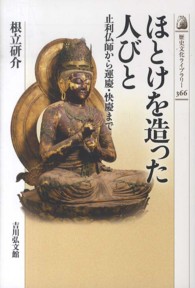- ホーム
- > 洋書
- > 英文書
- > Religion / Ethics
Full Description
The essays in this volume were written when John Henry Newman was a Fellow of Oriel College, Oxford. He wrote the first, on biblical miracles "The Miracles of Scripture," in 1825-26, as a relatively young man; the other, "The Miracles of Early Ecclesiastical History," was written in 1842-43. A comparison of the two essays displays a shift in Newman's theological stances.
In the earlier essay, Newman argues in accordance with the theology of evidence of his time, maintaining that the age of miracles was limited to those recorded in the Old Testament scriptures and in the Gospels and Acts. He asserts that biblical miracles served to demonstrate the divine inspiration of biblical revelation and to attest to the divinity of Christ. However, with the end of the apostolic age, the age of miracles came to an end; miracles reported from the early ages of the Church Newman dismissed as suspicious and possibly fraudulent. With this view, Newman entered into an ongoing debate between the skepticism of Hume and Paine and its continuation in the utilitarianism of Bentham, on the one hand, and the views of Christian apologists rebutting Hume's arguments, on the other.
In "The Miracles of Early Ecclesiastical History," Newman can be seen as coming closer to accepting the doctrines of the Catholic Church. He rejects the stance he took in "The Miracles of Scripture," now arguing for a continuity of sacred history between the biblical and ecclesiastical periods. He had clearly abandoned the position of "evidence theologians" that miracles ended after the time of the Apostles. Newman's movement between the writing of the two essays is essentially a growing into a deeper awareness of the Church as a divine society in whose life miracles and supernatural gifts were to be expected.








